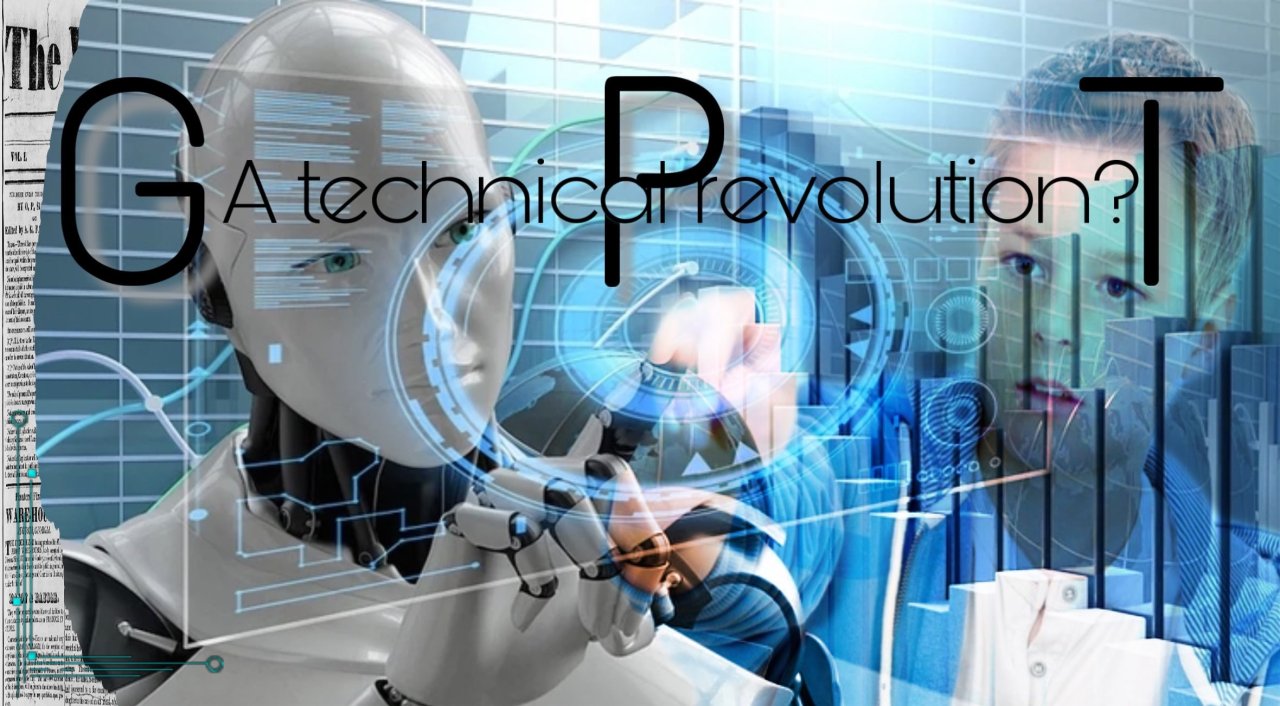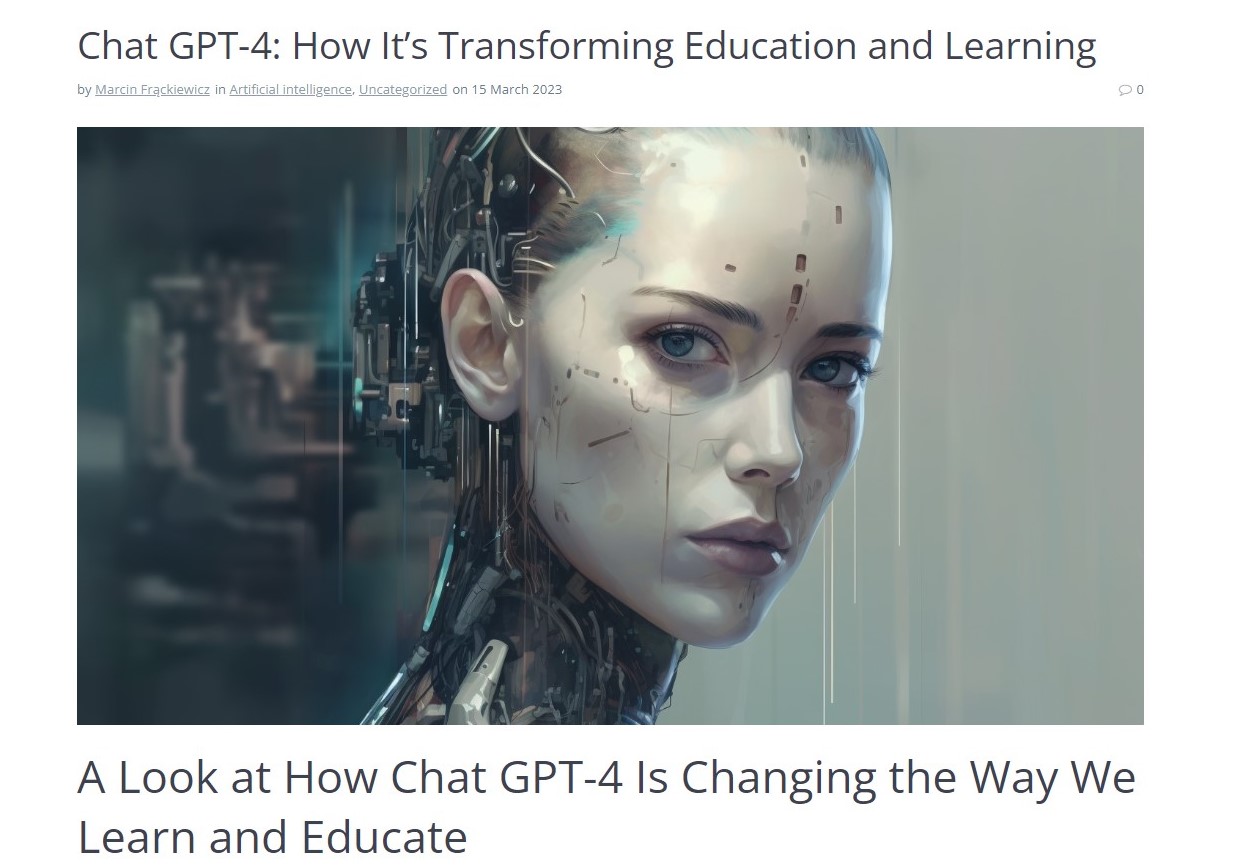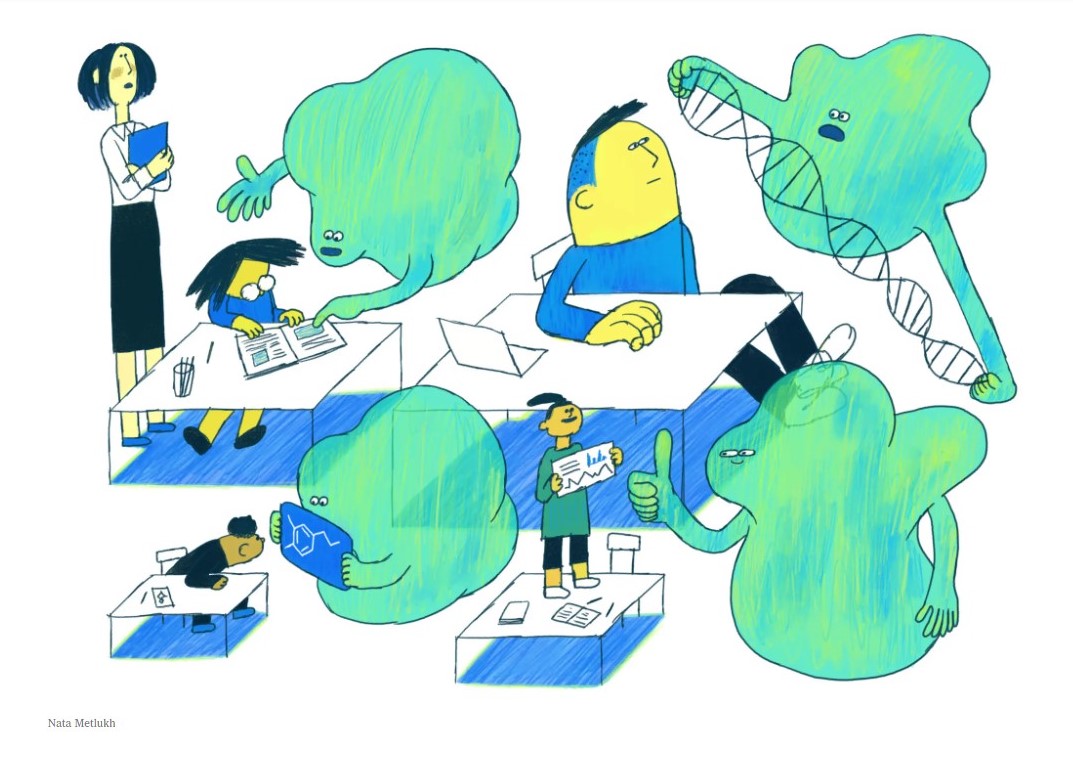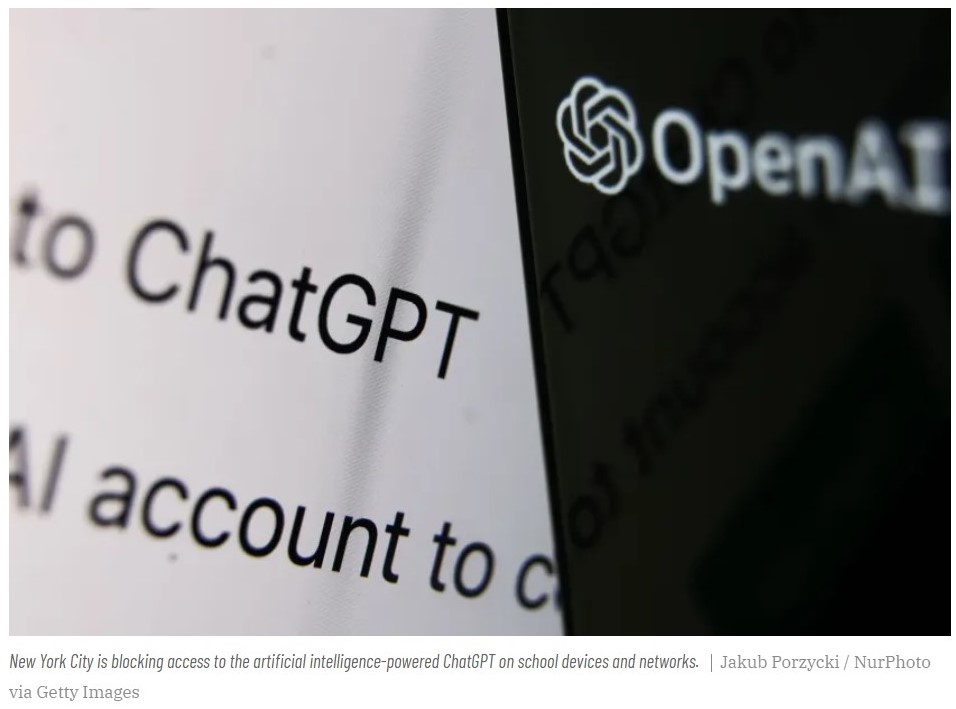How can AI affect the educational process?

On December 6, 2022, The Atlantic website was posted the article “The College Essay Is Dead. Nobody is prepared for how AI will transform academia” by Stephen Marche. Our team was interested in the using of ChatGPT in education.
We have analyzed several articles published in foreign and Russian media in 2023 to identify the pros and cons of using artificial intelligence for educational purposes. We examined the extent to which ChatGPT has become a tool for writing school essays and other assignments. And also, it is as an effective way to develop students ‘critical thinking.
The article “Chat GPT-4: How It’s Transforming Education and Learning” by Martin Fronckevich, published in TS2 on 15 March, describes the potential benefits of AI in education, such as personalized learning, improved academic performance, efficiency and student engagement directly in the learning process. Although ChatGPT-4 demonstrates the potential for personalized teaching and learning by generating assignments, recommendations and curriculum for individual students, saving their time and resources. The article shows concerns about the impact of neural networks on traditional teaching methods. If students constantly rely on technology to complete tasks and find answers, they may stop developing their own skills, writes Martin Fronzkiewicz.

In general, the using of artificial intelligence for educational purposes is considered possible. As the author of the above article suggests, ChatGPT-4 can help improve the quality of education by enhancing the way teachers and students interact. Deciding how to use this technology effectively and efficiently in the classroom is likely to be up to each participant of educational process.
Amanda Werner also discusses the pros and cons of an AI tool like ChatGPT on her podcast “Amanda Write Now”. She used the technology and talked about how a neural network can execute users’ wildest commands. Amanda Werner asked ChatGPT to analyse her short story and stressed that publishing AI-based material is largely plagiarism.
The author also gave her views on how artificial intelligence could affect modern education. She identified seven key points:
- Using ChatGPT for writing shifts the focus from learning the structure of essay and other forms of writing to teaching students critical thinking, research methods and creative organization through various forms of media.
- ChatGPT can become a feedback tool for students, allowing them to add to or change their written texts more quickly and easily.
- ChatGPT can grade work and provide feedback, which calibrates the assessment process and allows teachers to see a different opinion to their own. Students can also revise work based on feedback before final submission.
- By working with ChatGPT, students can improve their text-editing skills.
- Homework is not a necessary part of the learning process, so the use of artificial intelligence is not very threatening here.
- ChatGPT as a tool for teaching critical thinking can be used in discussions on analytical and philosophical issues under the supervision and guidance of teachers.
- Using ChatGPT to find and learn new, reliable information makes researching easier.
Amanda Werner is positive about the prospects of using artificial intelligence in the learning process. She also stresses that the only fear teachers have is the fear of the unknown. As AI continues to evolve and change, interpersonal communication, the most important form of communication, will not be affected.
It is no secret that many teachers not only in secondary schools but also in high schools are concerned that artificial intelligence could be a barrier to learning and even a tool for student cheating. Kevin Rose, the author of “Don’t Ban ChatGPT in Schools. Teach With It”, published in the New York Times website on January 12, believes that ChatGPT has its place in the educational process. He points out that there is no way to completely ban students from using AI, so it will still creep into the learning process in one way or another. Some teachers, on the other hand, are hoping for software that can recognize texts created by artificial intelligence. The author of the above article is convinced that these types of regulation often fail because they can often be fooled by changing the code or using a different neural network. As artificial intelligence is constantly evolving and new developments appear, teachers cannot keep track of every new version of the Chat network in order to block it.

The main message of the article is that it is pointless to wage war against artificial intelligence, which is constantly evolving. ChatGPT can be used to assist teachers and help them to allocate resources efficiently.
In spite of the benefits outlined above, there are other points of view on Chat GPT, which have also been described by journalists from many other media outlets in their analyses. On January 4, ChalkBeat New York website was published the article “NYC education department blocks ChatGPT on school devices, networks” by Michael Elsen-Rooney. He writes that the NYC Department of Education has blocked ChatGPT from being used on school devices.

Here is a comment by Jenna Lyle, a spokeswoman, Department of Education, NY. She quoted in the article:
Due to concerns about negative impacts on student learning, and concerns regarding the safety and accuracy of content, access to ChatGPT is restricted on New York City Public Schools’ networks and devices. While the tool may be able to provide quick and easy answers to questions, it does not build critical-thinking and problem-solving skills, which are essential for academic and lifelong success.
Concerns about the use of ChatGPT in education are valid. There have already been several cases where a neural network has provided incorrect information. One of them is shown in the article “Will Artificial Intelligence Replace Programmers?”, which was published by Pavel Melnik in Rossiyskaya Gazeta on
April 4. Google’s Bard AI is said to have given the wrong answer when asked which new findings from the James Webb Space Telescope could be shared with a nine-year-old. Bot reported that the telescope had been used to take the first ever images of a planet outside the solar system. In fact, the first such image was taken by a team of scientists led by Gael Chauvin using an adaptive optics tool. The error didn’t go unnoticed by users, and Google’s share price dropped by $100 billion.
In addition, the article “Learning to lie: AI tools adept at creating disinformation and propaganda too” by David Keppler, published in the CTV News website on January 24, describes experiments in which a chatbot was used to create disinformation. The researchers asked AI to write a blog post, news article or an essay arguing that vaccines against COVID-19 are unsafe. The chatbot fulfilled this requirement.
We asked expert Yuri Batashev, IT specialist in CEO of Quantum Inc. to answer some questions about using chatbots as a possible means of deliberate information distortion:
The original ChatGPT, which was so infamous, clearly shows the presence of individual anomalies, i.e. outright lies when answering some questions. The correct answers are given by historical sources. For example, in response to the question “Who was the winner of the Second World War?” ChatGPT answered:” The United States and its allies won, with the Soviet Union somewhere “on the sidelines”. Yuri Batashev states:” We know that this is not true. Then some rhetorical question arises: How could such an answer be born in a system that consists of statistical mathematical operations? Is it perfectly logical and accurate at its core? My expert opinion is that such a situation could have arisen by training ChatGPT on a limited sample of ideologically filtered material.In other words, if a system that’s capable to remember information is trained on a specially selected core of knowledge, it will only rely on it. For example, Americans are convinced that their country is the greatest country in the world and is the first in space. But you and I know the fact that it is not true
— our expert says.
However, going back to Michael Elsen-Rooney’s article ”NYC education department blocks ChatGPT on school devices, networks”, we should note that there are also opposing views that argue against blocking Chat. According to teacher Adam Stevens, ChatGPT can still be useful in the learning process, as it generates “basic” answers to essay questions, allowing students with their teachers to analyze the feedback they receive and to reflect on how to improve their writing.
We asked our expert, Nikolai Zolotykh, Director of the Institute of Information Technology, Mathematics and Mechanics at UNN, Ph.D. in Physics and Mathematics, to tell us more about how artificial intelligence affects learning and whether it should be introduced into the educational process.
ChatGPT is a tool for inclusion of all human experience in any field and an improved search engine like Google or Yandex, and in my opinion it should be used for educational purposes. Of course, if students start using ChatGPT and similar systems to write essays and term papers, there should be some prohibitions. This is true for the negative aspects of using AI tools and we will have to create special systems to keep this under control. However, it makes no sense to ban such a powerful tool. Try banning people from using Google!
— the expert says.
He also stated that ChatGPT could be used as a personal coach. This would allow each student to have his or her own personal teacher, thus increasing the possibility of individual education. Nikolai Zolotykh also emphasized the need to shape and select the content of ChatGPT training. That is to say, information that meets moral and ethical standards.
Conclusion
There is no doubt that the use of artificial intelligence in education is seen as a promising and innovative approach that can significantly improve the education system. Tools based on artificial intelligence can personalize the learning process, making it more effective.
The foreign mass media are generally positive about its use. If we look at the Russian media, they have also reported on educational initiatives involving the use of the neural network. The development of digital learning platforms using artificial intelligence technologies should be noted here. The growing interest of both developers and users cannot stop this progress.
Although some aspects of the use of artificial intelligence still involve risks and ethical consequences, its benefits offer enormous potential for development, not only in education but also in the rest of human life.
AUTHORS
© Daniel Bouilov, Sabina Vagapova, Daria Ivantsova, Anastasia Kudriavtseva